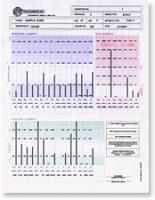Sodium To Potassium Ratio
Order a Hair Tissue Mineral Analysis – Hair Test Here
The sodium to potassium ratio is called the “life death ratio” or the “stress ratio” because it is so critical.
It is related to the sodium pump mechanism of the electrical potential of cells which is regulated by sodium and potassium levels.
The sodium to potassium ratio is intimately related to kidney, liver, and adrenal gland function.
 Sodium is normally extracellular while potassium is normally intracellular. If the ratio of these minerals is imbalanced, it indicates important physiological malfunctions within the cells. An imbalance in the sodium to potassium ratio is associated with heart, kidney, liver and immune system deficiencies. The sodium to potassium ratio is also very closely linked to adrenal function in the balance between aldosterone, which is a mineral corticoid and cortisone, which is a glucocorticoid secretion.
Sodium is normally extracellular while potassium is normally intracellular. If the ratio of these minerals is imbalanced, it indicates important physiological malfunctions within the cells. An imbalance in the sodium to potassium ratio is associated with heart, kidney, liver and immune system deficiencies. The sodium to potassium ratio is also very closely linked to adrenal function in the balance between aldosterone, which is a mineral corticoid and cortisone, which is a glucocorticoid secretion.
Sodium To Potassium Ratios:
- 6+ – Severe elevation, information and adrenal and balance. High ratios can also be associated with asthma, allergies, kidney and liver problems.
A high sodium/potassium ratio is considered preferable to a low sodium/potassium ratio. - 4 to 6 – Moderate elevation tendency towards inflammation
- 2.5 to 4 – mild elevation could adrenal function
- 2.5 – Ideal
- 2 to 2.5 – mild inversion beginning of adrenal exhaustion
- 1 to 2 – moderate inversion, kidney and liver dysfunction, allergies, arthritis, adrenal exhaustion, digestive problems, excess of hydrochloric acid.
- Below 1 – severe inversion tendency towards heart attack, cancer, arthritis, kidney and liver disorders.
Factors That Modify The Meaning Of The Sodium to Potassium Ratio:
- Occasionally the sodium potassium ratio will be were sent to retest but the patient feels better.
- This is because some other mineral ratios on the chart are improved such as the elimination of cadmium or copper or there is normalization of another mineral ratio.
- Elimination or dumping of a heavy metal toxins and is the most common cause of a sodium/potassium minute version on a retest chart.
- Occasionally a sodium or potassium loss can occur especially so in the presence of calcium and magnesium excess or deficiency.

